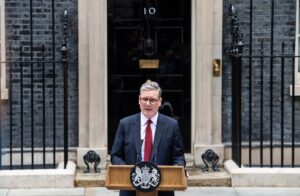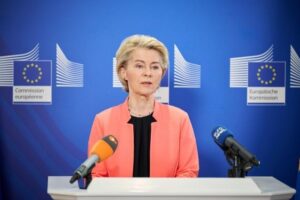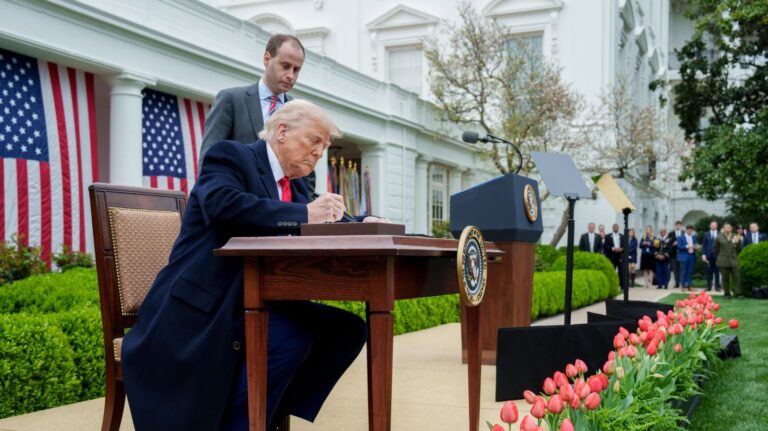On 2 April 2025, US president Donald Trump held a press conference from the White House Rose Garden, on a day the world had been waiting in anticipation for: his so-called ‘Liberation Day’. During this press conference, he – as expected – announced new tariffs on goods imported to the US from different countries around the world.
“My fellow Americans, this is Liberation Day,” Trump remarked as the press conference commenced. “We’ve been waiting for a long time. 2 April 2025 will be forever remembered as the day American industry was reborn, the day America’s destiny was reclaimed, and the day that we began to make America wealthy again.”
“For years hard-working American citizens were forced to sit on the sidelines as other nations got rich and powerful, much of it at our expense. But now it’s our turn to prosper and in so doing use trillions and trillions of dollars to reduce our taxes and pay down our national debt, and it’ll all happen very quickly. […]
“Jobs and factories will come roaring back into our country, and you see it happening already. We will supercharge our domestic industrial base, we will pry open foreign markets and break down foreign trade barriers, and – ultimately – more production at home will mean stronger competition and lower prices for consumers. This will indeed be the golden age of America – it’s coming back.”
Sat at a desk with the White House behind him, Trump signed an executive order declaring a state of national emergency and imposing new tariffs on imports from around the world. He described this action as the US’ “declaration of economic independence”.
Tariffs for everyone
A 10% baseline tariff will be introduced from 5 April 2025 on all goods imported from the US. This 10% rate will – as it stands – be applied to imports to the US from the UK.

Speaking to the press in the wake of this announcement from the other side of the Atlantic, UK prime minister Sir Keir Starmer said the government was “prepared” for this tariff and will “keep a cool head” in its response.
“Nobody wins in a trade war; that is not in our national interest,” Starmer stated. “We have a fair and balanced trade relationship with the US. Negotiations on an economic prosperity deal – one that strengthens our existing trading relationship – they continue, and we will fight for the best deal for Britain.”
Rain Newton-Smith, CEO of the Confederation of British Industry (CBI), expressed support for the UK’s policy in response to the new tariff, saying: “Business has been clear: there are no winners in a trade war. Today’s announcements are deeply troubling for businesses and will have significant ramifications around the world.
“A cool and calm reaction from the UK government is the right response: UK firms need a measured and proportionate approach which avoids further escalation. Retaliation will only add to supply chain disruption, slow down investment, and stoke volatility in prices.
“The government has rightfully tried to negotiate a carveout to any incoming tariffs through a bilateral economic deal. As they seek to grow the economy, negotiating stronger trading relationships with all like-minded partners will be foundational to any success.
“The UK must use this unpredictable period to double down on its commitment to free, fair and open trade. Doing so will provide businesses with the confidence needed to kickstart growth, foster innovation, and boost productivity.”
Amongst the other nations to which only the 10% base rate tariffs apply are Australia, New Zealand, Singapore, Argentina, Colombia, Saudi Arabia and the United Arab Emirates (UAE).
Australian prime minister Anthony Albanese said the tariffs were “not unexpected” but “totally unwarranted”. Although he described the tariffs as “not the act of a friend”, he said the Australian government “will not be seeking to impose reciprocal tariffs”.
Higher rates for the “worst offenders”
Aside from the new flat-rate tariffs on most of the world, bespoke “reciprocal” tariffs were announced for what White House officials have reportedly described as the “worst offenders” when it comes to trade with the US. Around 60 countries will be subject to these higher rates.
An additional 34% tariff will be imposed on China, which – when combined with the earlier 20% tariff – will take the total tariff rate to 54%. China’s commerce ministry has reportedly called for the US government to immediately cancel this tariff.
A spokesperson for China’s Ministry of Commerce said in a statement: “China firmly opposes this and will take countermeasures to safeguard its own rights and interests.”
Additionally, the European Union will be subject to a 20% tariff under these new measures. Trump described the EU as “tough traders”, adding: “They rip us off, it’s so sad to see, it’s so pathetic.”

In a statement following the announcement from the White House, president of the European Commission Ursula von der Leyen said: “President Trump’s announcement of universal tariffs on the whole world, including the EU, is a major blow to the world economy. I deeply regret this choice.
“Let’s be clear-eyed about the immense consequences. The global economy will massively suffer. Uncertainty will spiral and trigger the rise of further protectionism. The consequences will be dire for millions of people around the globe.”
She went on to say: “I agree with president Trump, that others are taking unfair advantage of the current rules. And I am ready to support any efforts to make the global trading system fit for the realities of the global economy.
“But I also want to be clear: reaching for tariffs as your first and last tool will not fix it. That is why, from the outset, we have always been ready to negotiate with the US, to remove any remaining barriers to transatlantic trade.
“At the same time, we are prepared to respond. We are already finalising a first package of countermeasures in response to tariffs on steel. And we are now preparing for further countermeasures, to protect our interests and our businesses if negotiations fail.”
She pointed towards an “alternative path”, saying: “It is not too late to address concerns through negotiations.”
Other countries facing higher tariffs include Japan (24%), India (26%), Vietnam (46%), Cambodia (49%), Taiwan (24%) and South Korea (25%).
LIBERATION DAY RECIPROCAL TARIFFS 🇺🇸 pic.twitter.com/ODckbUWKvO
— The White House (@WhiteHouse) April 2, 2025
Tariffs on Canada and Mexico were not affected by the announcement on 2 April, and will continue as set out by the latest tariff adjustment on these countries.
These new tariffs follow a 25% tariff on cars and car parts manufactured outside the US, which came into effect on 3 April, and a 25% tariff on imported steel and aluminium, which came into effect on 12 March.
How has the US manufacturing sector responded to the news?
While reactions from around the world have – unsurprisingly – been predominantly negative, responses from within the US, and the US manufacturing sector in particular, have been mixed.
Scott Paul, president of the Alliance for American Manufacturing, said: “Today’s trade action prioritises domestic manufacturers and America’s workers. These hardworking men and women have seen unfair trade cut the ground from beneath their feet for decades.
“They deserve a fighting chance. Our workers can out-compete anyone in the world, but they need a level playing field to do it. This trade reset is a necessary step in the right direction.”
But on the other hand, Jay Timmons, president and CEO of the National Association of Manufacturers, commented: “The stakes for manufacturers could not be higher. Many manufacturers in the United States already operate with thin margins. The high costs of new tariffs threaten investment, jobs, supply chains and, in turn, America’s ability to outcompete other nations and lead as the preeminent manufacturing superpower.”
What’s next?
The impact of these new tariffs on supply chains is inevitable, but the extent to which supply chains will be affected remains to be seen. If trade wars escalate as a result, the effects on global trade could be devastating. Reshoring could well be a trend that accelerates as uncertainty grows, and companies may begin to reconsider where their manufacturing and logistics operations are based.
For more news and analysis of global trade and the relationship between geopolitics and supply chains, check out the April issue of Logistics Manager – out now!
Inside this issue: facts and figures; news and analysis; an AI in the Supply Chain feature; an Alternative Fuels feature; a Sustainable Packaging feature; property news; a Properties and the Local Community feature; a Mid-Box Property feature; and so much more!







